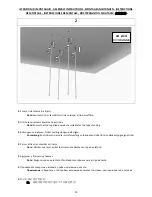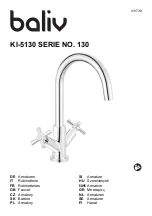
29
Pulizia – Cleaning – Pflege – Nettoyage – Limpieza – Очистка -
清洁
L’acciaio inossidabile può subire anche notevoli danni se non viene trattato con le dovute precauzioni.
La sua resistenza e durata, sono strettamente legate ad un uso opportuno, a buona manutenzione e all’uso di prodotti e materiali di
pulizia idonei a preservarne le caratteristiche originali.
Sono assolutamente da evitare prodotti detergenti a base di cloro, come ad esempio la candeggina o prodotti analoghi
normalmente in commercio, poiché possono produrre seri effetti di corrosione se non abbondantemente, rapidamente ed
opportunamente risciacquati. Il contatto o solo i vapori emanati da prodotti acidi (l’acido muriatico/cloridrico) o alcalini (l’ipoclorito di
sodio/candeggina/varecchina) o ammoniaca, utilizzati direttamente o contenuti nei comuni detersivi, per la pulizia e la igienizzazione
di pavimenti, piastrelle e superfici lavabili, possono avere un effetto ossidante/corrosivo sull’acciaio inox.
Questa pratica può causare in breve tempo gravi danni alla struttura d
ell’acciaio, rendendo instabili i legami molecolari nelle zone di
coesione dove esistono saldature, pieghe, puntature, ecc., dando luogo a distaccamenti o perdite più o meno accentuate dei
recipienti.
Non appoggiare strofinacci, spugne o altro del genere, imbevute di normalissimi detergenti a base di cloro o ammoniaca senza aver
neutralizzato e sciacquato opportunamente questo "contatto" con un detersivo neutro. È altresì importante sapere che l’uso di
paglietta di ferro o di strumenti analoghi rimanere depositate sulla superficie delle apparecchiature innescando per contatto un
rapido processo di corrosione irreversibile o difficilmente bonificabile se non si interviene in breve tempo.
-----------------------------------------------------------------------------------------------------------------------------------------------------------------------------
EN
Stainless steel can suffer considerable damage if not treated with care. Its strength and durability depend on its proper use, correct
maintenance and the use of cleaning products and materials that preserve the original characteristics.
Never use chlorine-based cleaning products, for example bleach or similar products that can be found on the market, as they can
lead to serious corrosion if not thoroughly, quickly and properly rinsed.
Contact or even the vapours from acid (muriatic / hydrochloric acid ), alkali (sodium hypochlorite / bleach) or ammonia, used directly
or diluted in common detergents, in the cleaning and sanitizing of floors , tiles and washable surfaces, can have an oxidizing/
corrosive effect on stainless steel.
This can result in serious damage to the structure of the steel over a short period of time, rendering unstable the intermolecular
cohesion in areas where there are welds, creases, spot-welds etc., resulting in the receptacles breaking away or leaking.
Do not put cloths, sponges or anything similar that has been soaked in common chlorine or ammonia-based detergents on the
surface, without having first neutralized and rinsed the "contact" thoroughly with a neutral detergent. It is also important to know that
if ferrous wire wool or similar products are left on the surface of the device, they will trigger a rapid corrosion process that is either
irreversible or difficult to remedy if not treated as quickly as possible.
------------------------------------------------------------------------------------------------------------------------------------------------------------------------------
DE
Edelstahl kann auch beachtliche Schäden erleiden, wenn er nicht mit den entsprechenden Vorkehrungen behandelt wird.
Seine Widerstandsfähigkeit und Dauer hängen von einem angemessenen Gebrauch, einer ordentlichen Wartung und
dem Gebrauch von geeigneten Reinigungsprodukten und Reinigungsmaterialien ab, um die Originaleigenschaften
aufrechtzuerhalten.
Reinigungsprodukte auf Basis von Chlor, wie zum Beispiel Bleichmittel oder analoge im Handel erhältliche Produkte, sind
zu vermeiden, weil sie ernsthafte Korrosionswirkungen haben können, wenn sie nicht reichlich, schnell und angemessen
abgewaschen werden. Der Kontakt oder nur die Dämpfe von säurehaltigen Produkten (Salzsäure/Hydrochloridsäure),
Alkalinen (Natriumhypochlorit/Bleichmittel) oder Ammoniak, die zur Reinigung und Hygienisierung von Fu
βböden, Fliesen
und abwaschbaren Oberflächen direkt benutzt werden oder in herkömmlichen Reinigungsmitteln enthalten sind, können
eine oxidierende/korrosive Wirkung auf den Edelstahl haben.
Dadurch können innerhalb von kurzer Zeit schwerwiegende Schäden an der Stahlstruktur entstehen und die
Molekularverbindungen in den Verbindungsbereichen unstabil machen, wo Nahtstellen, Knicke, Schweiβstellen etc.
existieren, und somit Ablösungen oder mehr oder weniger ausgeprägten Austritt der Behälter verursachen.
Keine Lappen, Schwämme oder sonstige Instrumente dieser Art, die mit herkömmlichen Reinigungsmitteln auf Chlor- oder
Ammoniakbasis getränkt sind, ablegen, ohne diese „Kontaktstelle“ mit einem neutralen Reinigungsmittel neutralisiert und
abgewaschen zu haben. Es ist auch wichtig zu wissen, dass Stahlwolle oder analoge Instrumente, die auf der Oberfläche der
Gerätschaften abgelegt werden, bei Kontakt einen schnellen Korrosionsprozess auslösen, der unwiderruflich oder schwer behebbar
ist, wenn nicht innerhalb von kurzer Zeit eingegriffen wird.
-----------------------------------------------------------------------------------------------------------------------------------------------------------------------------
FR
L’acier inoxydable peut aussi subir des dommages considérables s’il n’est pas traité avec les précautions nécessaires.
Sa résistance et sa durée sont étroitement liées à une utilisation adéquate
, à un bon entretien et à l’utilisation de produits
et matériaux de nettoyage aptes à préserver ses caracté
ristiques d’origine.
Il faut absolument éviter les produits nettoyants à base de chlore, comme par exemple l’eau de javel ou des produits
analogues normalement disponibles dans le commerce, parce qu’ils peuvent produire de sérieux effets de corrosion s’ils
ne sont pas rincés abondamment, rapidement et convenablement.
Le contact ou rien que les vapeurs émanant de produits acides (l’acide muriatique/chlorhydrique) ou alcalins
(l’hypochlorite de sodium/l’eau de javel) ou l’ammoniaque, utilisés directement ou contenus dans les produits nettoyants
communs, pour le nettoyage et la désinfection de sols, carrelages et surfaces lavables, peuvent avoir un effet
oxydant/corrosif sur l’acier inox.
Содержание My wellness 0524496
Страница 12: ...12 ...
Страница 26: ...26 FUNZIONAMENTO WORKING FUNKTIONSWEISE FONCTIONNEMENT FUNCIONAMIENTO ИСПОЛЬЗОВАНИЕ 运行 ...



































